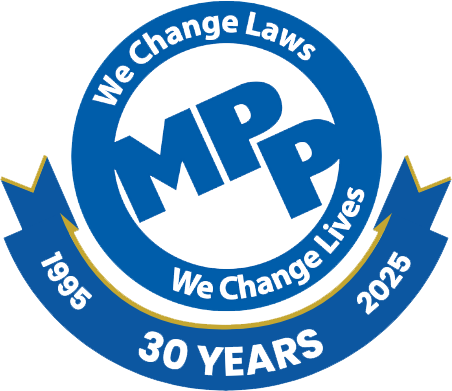- Take Action: Urge your state legislators to support a compassionate medical cannabis program!
Press Release
Massachusetts House and Senate Reach Compromise on Legalization Implementation Bill

FOR IMMEDIATE RELEASE
Tuesday, July 18, 2017
Contact: Violet Cavendish
vcavendish@mpp.org
The House had previously voted for far-reaching changes to the law passed by voters in November 2016; compromise bill more closely reflects ballot initiative
BOSTON, Mass. – After weeks of talks and missed deadlines, legislators in Massachusetts have reached an agreement on legislation that will make changes to Question 4, the law to regulate marijuana for adults that was approved by voters in November 2016.
“After weeks of intense advocacy from Massachusetts voters, legislators have decided to respect the will of the people,” said Matthew Schweich, director of state campaigns for the Marijuana Policy Project and one of the leaders of the 2016 campaign. “We are relieved that the legislature has dropped the House’s ‘repeal and replace’ bill introduced last month, which would have made damaging changes to the law.”
The compromise bill’s most significant changes relate to local control and taxes. The legislation adjusts the local control policy, allowing local government officials in towns that voted “no” on the 2016 ballot initiative to ban marijuana businesses until December 2019. For towns that voted “yes” in 2016, any bans must be placed on a local ballot for voters to approve. The maximum sales tax rate (which depends on whether towns adopt optional local taxes) will increase from 12% to 20%. Under the bill, the state tax will be 17% and the local option will be 3%.
“The law passed by voters was well-crafted and required no alteration,” said Schweich. “However, we respect the need for compromise, and while we don’t approve of every provision of this bill, we are satisfied that the outcome will serve the interests of Massachusetts residents and allow the Commonwealth to displace the unregulated marijuana market with a system of taxation and regulation.”
Last month, the House and Senate passed very different implementation bills before beginning negotiations to resolve their differences. Massachusetts residents made over 1,000 telephone calls to their lawmakers urging rejection of the House approach, while advocacy organizations put additional pressure on the legislature.
“We commend the Senate for holding the line on a number of important issues,” said Jim Borghesani, spokesperson for the 2016 Yes on 4 campaign and the subsequent advocacy effort to defend the law. “Now it’s time to provide funding that will allow the regulators to establish the rules that will govern marijuana cultivation and sales.”
The progress in Massachusetts will likely add momentum to regional efforts across New England to tax and regulate marijuana for adults.
“Maine is in the process of implementing its marijuana regulation law passed by voters, while legislators in Vermont, Rhode Island, and Connecticut all seriously considered bills to make marijuana legal for adults this year,” said Schweich. “The fact that marijuana sales will begin in Massachusetts in just one year will place added pressure on Rhode Island in particular. If legislators fail to take action, the Ocean State will soon be senselessly forfeiting significant and sorely-needed tax revenue to its neighbor.”
On July 1, Nevada became the fifth state in the nation to establish a regulated marijuana market for adults. Regulated marijuana sales are set to begin in Massachusetts in July 2018.
# # #
###
Founded in 1995, the Marijuana Policy Project (MPP) is the nation’s leading cannabis policy reform organization. MPP has played a central role in passing dozens of cannabis policy reforms in states across the country, including 14 successful cannabis legalization campaigns, and also works to advance federal reforms.
